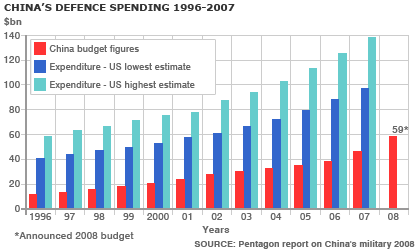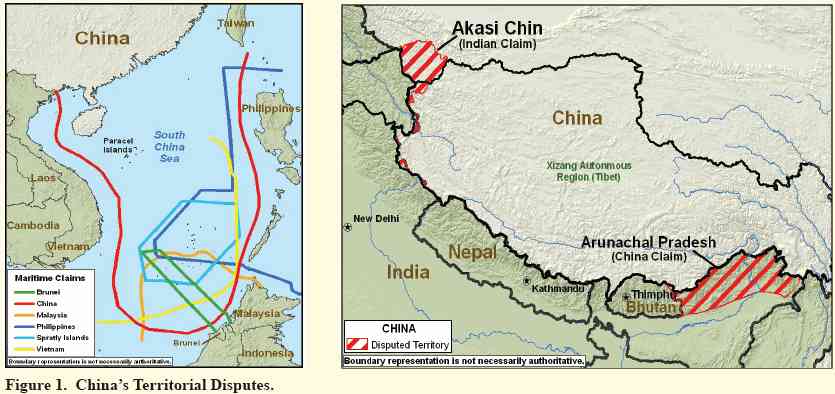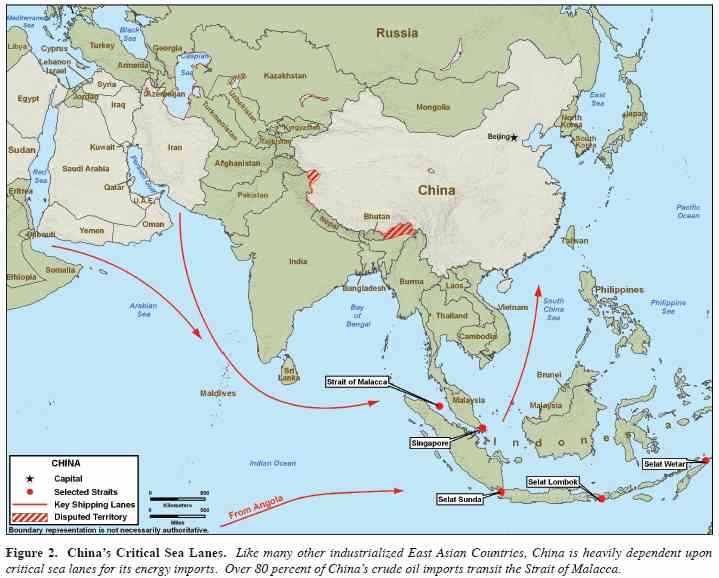
Dynamics

|
Generational Dynamics |
| Forecasting America's Destiny ... and the World's | |
| HOME WEB LOG COUNTRY WIKI COMMENT FORUM DOWNLOADS ABOUT | |
This comes as a new Pentagon report documents China's military buildup.
China has been announcing double-digit military budget increases since the 1990s, and now has announced another one, with a surge of nearly 18% in increased funding for 2008.
 |
Even so, Chinese secrecy is so great that US government officials believe that their military budget is substantially higher than announced, as shown on the adjoining graph.
The increase was announced just a day after the Pentagon released its 2008 Annual Report on Military Power of China. The report documents China's development of new weaponry, including leading edge high-tech weaponry, and criticizes China for a "lack of transparency" in explaining its strategy in such aggressive military development.
In such circumstances, China always exhibits what might in America be called Boomer paranoia. In the all-too-scrutable Chinese way of thinking, it's OK to keep threatening war over Taiwan and to budget huge military increases, but you're a warmonger if you say that "China is threatening war over Taiwan and budgeting huge military increases.
Here are the comments of the Chinese Foreign Ministry on the Pentagon report:
As for the issue of hacking, China's position is very clear. China follows a path of peaceful development, and unswervingly adopts a national defence policy which is defensive in nature. China would never do anything to harm sovereignty or security of other countries. We are strongly dissatisfied with the groundless accusation from the US. As a matter of fact, cyber crime is a common challenge facing all countries in the world. China also falls victim to hacking. We would like to work with other countries to jointly respond to this issue. We demand the US side to present compelling evidence for its accusation so that we can carry out cooperation in this regard."
In response to a follow-up question on whether China pays civilians to hack American computers, he said, "I can assure you responsibly that the Chinese Government never does such kind of thing."
The above is really an incredibly paranoid statement, and though it was given in response to a question at a press conference, it's a prepared statement representing official China policy.
If you want to read an even more incredible statement, look at the truly hysterical statements by the Foreign Ministry a year ago.
To me, this is really incredibly ominous. It's an exhibition of paranoia that's so extreme, it could take any form whatsoever -- including total panic and launching a pre-emptive war to recapture Taiwan.
At times like this, I'm reminded of Friedrich Nietzsche, the German philosopher, who lived through the Franco-Prussian war and the extremely bloody Paris Commune civil war in 1871, and saw incredible craziness and said, "Insanity in individuals is something rare - but in groups, parties, nations and epochs, it is the rule." In the case of China, you have 1.5 billion people exhibiting paranoid insanity, and it doesn't bode well for the world.
Earlier this week, on Tuesday, President Jintao Hu made the statement that the "Taiwan independence" activities have become "the biggest menace to national sovereignty and territorial integrity, the biggest obstacle to the development of cross-Strait relations, and the biggest threat to peace and stability in the Taiwan Straits."
There will be a Presidential election on Taiwan on March 22 and, at the same time, there will be a referendum on whether Taiwan wants to join the United Nations as a separate entity from China. Beijing bitterly opposes any such more in the U.N. but, more than that, they even oppose allowing such a referendum in Taiwan. There's no telling how Beijing will react if the referendum vote is "Yes."
Still, this paranoia is actually a reduction from the norm. The Chinese have actually been toning down the rhetoric lately, as they prepare for their big sweet 16 coming out party, the summer Olympic games in Beijing. My expectation is that the rhetoric is going to get much more hostile once the Olympic games are over.
Here are some excerpts from the Pentagon report, and some comments:
The following map from the report will give you a picture of what's going on here:
 |
In the map above on the left, notice the red line -- China is essentially demanding that everything in the South China Sea belongs to China, and you can see from the map that there are numerous other countries surrounding the South China Sea that would dispute China's claims. Of course, China also claims Taiwan. The map to the right shows disputed regions in central Asia that China claims.
Here's another map from the report, showing China's vital sea lanes:
 |
If China is exhibiting paranoid insanity over some islands in the South China Sea, you can imagine their paranoia over the vital sea lanes on which they depend.
China is now capable of using its missile technology to strike most parts of North America, as the following map shows:
 |
What all this reminds me of is a statement made by General Zhu Chenghu, a top-level officer in China's People's Liberation Army (PLA) that threatened America with nuclear war if America interfered with Taiwan. Speaking to a group of foreign journalists, General Zhu said,
Note that Xian is a city in central China. China is prepared to have half the country destroyed by nuclear weapons, rather than give up Taiwan, and will retaliate with intercontinental ballistic missiles.
When General Zhu made this statement in 2005, it was pooh-poohed as being beyond the capability of China. But it isn't beyond China's capabilities today.
In December 2006, in a test clearly targeting the United States, China successfully tested an anti-satellite weapon by blowing one of its own aging satellites out of the sky. It's believed that, in case of war, China could use this technology to destroy 50-100 American satellites within a few hours. This is an important feature of China's "acupuncture" strategy.
Hans Elmar Remberg, Vice President of the German Office for the Protection of the Constitution (Germany’s domestic intelligence agency), publicly accused China of sponsoring computer network intrusions “almost daily.” Remberg stated, “across the world the PRC is intensively gathering political, military, corporate-strategic and scientific information in order to bridge their technological gaps as quickly as possible.” Referring to reports of PRC infiltration of computer networks of the German government, German Chancellor Angela Merkel said “we must together respect a set of game rules.” Similarly, in September 2007, French Secretary-General of National Defense Francis Delon confirmed that government information systems had been the target of attacks from the PRC."
We noted earlier in this article that China's extreme paranoia could lead it to panic and launch pre-emptive war for not reason at all.
The Pentagon report supports this view as follows:
As PLA modernization progresses, three misperceptions could lead to miscalculation or crisis. First, other countries could underestimate the extent to which PLA forces have improved. Second, China’s leaders could overestimate the proficiency of their forces by assuming new systems are fully operational, adeptly operated, adequately maintained, and well integrated with existing or other new capabilities. Third, China’s leaders may underestimate the effects of their decisions on the security perceptions and responses of other regional actors."
This shows how dangerous the situation is, and how war with China could begin at any time.
People are always telling me that we would never bother to go to war with China over Taiwan. One person even sent me a poll that showed that the American people really don't care about Taiwan.
This shouldn't be a surprise, since most Americans these days probably couldn't find China on a map, let alone Taiwan.
Nonetheless, we could be at war with China over Taiwan at any time. Young people in Taiwan increasingly want independence from China, and the old generations that remember life on the Chinese mainland are mostly dead and gone now. Taiwan could do something on any day that would be seen as a move toward independence by the paranoid officials in Beijing. They would then launch a pre-emptive war on Taiwan.
Would the U.S. go to war to defend Taiwan? There is no question
about it. It would not be put to a vote of the American people. It
would not be put to a vote in Congress. The confrontation would
begin within hours, and the war would be on before most Americans
even learned how to spell "Taiwan."
(6-Mar-08)
Permanent Link
Receive daily World View columns by e-mail
Donate to Generational Dynamics via PayPal
Web Log Summary - 2016
Web Log Summary - 2015
Web Log Summary - 2014
Web Log Summary - 2013
Web Log Summary - 2012
Web Log Summary - 2011
Web Log Summary - 2010
Web Log Summary - 2009
Web Log Summary - 2008
Web Log Summary - 2007
Web Log Summary - 2006
Web Log Summary - 2005
Web Log Summary - 2004
Web Log - December, 2016
Web Log - November, 2016
Web Log - October, 2016
Web Log - September, 2016
Web Log - August, 2016
Web Log - July, 2016
Web Log - June, 2016
Web Log - May, 2016
Web Log - April, 2016
Web Log - March, 2016
Web Log - February, 2016
Web Log - January, 2016
Web Log - December, 2015
Web Log - November, 2015
Web Log - October, 2015
Web Log - September, 2015
Web Log - August, 2015
Web Log - July, 2015
Web Log - June, 2015
Web Log - May, 2015
Web Log - April, 2015
Web Log - March, 2015
Web Log - February, 2015
Web Log - January, 2015
Web Log - December, 2014
Web Log - November, 2014
Web Log - October, 2014
Web Log - September, 2014
Web Log - August, 2014
Web Log - July, 2014
Web Log - June, 2014
Web Log - May, 2014
Web Log - April, 2014
Web Log - March, 2014
Web Log - February, 2014
Web Log - January, 2014
Web Log - December, 2013
Web Log - November, 2013
Web Log - October, 2013
Web Log - September, 2013
Web Log - August, 2013
Web Log - July, 2013
Web Log - June, 2013
Web Log - May, 2013
Web Log - April, 2013
Web Log - March, 2013
Web Log - February, 2013
Web Log - January, 2013
Web Log - December, 2012
Web Log - November, 2012
Web Log - October, 2012
Web Log - September, 2012
Web Log - August, 2012
Web Log - July, 2012
Web Log - June, 2012
Web Log - May, 2012
Web Log - April, 2012
Web Log - March, 2012
Web Log - February, 2012
Web Log - January, 2012
Web Log - December, 2011
Web Log - November, 2011
Web Log - October, 2011
Web Log - September, 2011
Web Log - August, 2011
Web Log - July, 2011
Web Log - June, 2011
Web Log - May, 2011
Web Log - April, 2011
Web Log - March, 2011
Web Log - February, 2011
Web Log - January, 2011
Web Log - December, 2010
Web Log - November, 2010
Web Log - October, 2010
Web Log - September, 2010
Web Log - August, 2010
Web Log - July, 2010
Web Log - June, 2010
Web Log - May, 2010
Web Log - April, 2010
Web Log - March, 2010
Web Log - February, 2010
Web Log - January, 2010
Web Log - December, 2009
Web Log - November, 2009
Web Log - October, 2009
Web Log - September, 2009
Web Log - August, 2009
Web Log - July, 2009
Web Log - June, 2009
Web Log - May, 2009
Web Log - April, 2009
Web Log - March, 2009
Web Log - February, 2009
Web Log - January, 2009
Web Log - December, 2008
Web Log - November, 2008
Web Log - October, 2008
Web Log - September, 2008
Web Log - August, 2008
Web Log - July, 2008
Web Log - June, 2008
Web Log - May, 2008
Web Log - April, 2008
Web Log - March, 2008
Web Log - February, 2008
Web Log - January, 2008
Web Log - December, 2007
Web Log - November, 2007
Web Log - October, 2007
Web Log - September, 2007
Web Log - August, 2007
Web Log - July, 2007
Web Log - June, 2007
Web Log - May, 2007
Web Log - April, 2007
Web Log - March, 2007
Web Log - February, 2007
Web Log - January, 2007
Web Log - December, 2006
Web Log - November, 2006
Web Log - October, 2006
Web Log - September, 2006
Web Log - August, 2006
Web Log - July, 2006
Web Log - June, 2006
Web Log - May, 2006
Web Log - April, 2006
Web Log - March, 2006
Web Log - February, 2006
Web Log - January, 2006
Web Log - December, 2005
Web Log - November, 2005
Web Log - October, 2005
Web Log - September, 2005
Web Log - August, 2005
Web Log - July, 2005
Web Log - June, 2005
Web Log - May, 2005
Web Log - April, 2005
Web Log - March, 2005
Web Log - February, 2005
Web Log - January, 2005
Web Log - December, 2004
Web Log - November, 2004
Web Log - October, 2004
Web Log - September, 2004
Web Log - August, 2004
Web Log - July, 2004
Web Log - June, 2004